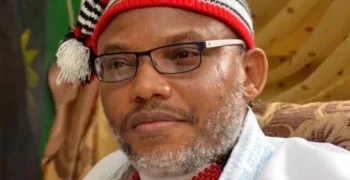Nnamdi Kanu, the leader of the proscribed Indigenous People of Biafra (IPOB), has abandoned his plans to resume a terrorism trial against him, boldly declaring that the Nigerian government has no case against him. Kanu, who has chosen to represent himself, appeared before Justice James Omotosho at the Federal High Court in Abuja.
He urged the court to order his immediate release or grant him bail, describing the proceedings as a “baseless” charade.
The hearing, which was originally scheduled for Kanu to start presenting evidence—including up to 23 witnesses ranging from local activists to international figures—took a different turn when Kanu addressed the bench directly.
He stated, “Join me in praising God; I have reviewed my case file, and there is no charge against me. There is no extant law in this country upon which the prosecution can predicate me. If there are any, let my Lord read them out to me.”
He further argued that entering a defence would be pointless in the absence of a credible case, effectively pivoting to a “no-case-to-answer” submission.
This development comes just days after the court adjourned on October 24 to allow Kanu access to his case file after the dismissal of his legal team. Prosecutors, represented by Adegboyega Awomolo (SAN) on behalf of the Federal Government, reminded the court of the prior directive but offered no immediate rebuttal to Kanu’s claims during the proceedings.
In response to Kanu’s oral application, the judge instructed him to formalise his position in writing and to consider consulting criminal law experts regarding the risks of waiving his right to testify. “You have the right to defend yourself under Section 36 of the Constitution,” Omotosho noted, “but you cannot be compelled to testify if you choose to waive that right.”
The court has adjourned the matter to November 4, 5, and 6, 2025, for parties to file and adopt their final written addresses ahead of a potential ruling. Legal observers caution that Kanu’s strategy, while bold, carries significant risks: a successful no-case ruling could lead to acquittal, but a rejection of his motion might result in a conviction based solely on the prosecution’s evidence.

Administrator and Writer























































